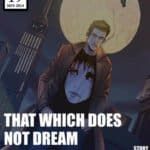Part Five: July 20, 1992
The old man hangs in the air, frayed white linen hanging from his gaunt, feeble frame like the last drooping fronds of a dying willow. He’s lost track of how long he’s been there—months? Years? Long enough that he can barely remember anything else. The power that suspends him also sustains him—it is a prison, not a tomb—but it provides only enough sustenance to prevent his death.
Each day he struggles to master his hunger and his thirst, steeling himself to meet his captor, and each day they go through the same ritual. His former mentor and friend accosts him, threatens him, makes demands he cannot possibly fulfill—and, when the day nears its end, he threatens to do worse the day that follows. But for his captor that day never comes: he’s still trapped in the death-throes of the island, and when the island resets, so does he. And so the next day the old man is forced to do it all again, and the next day, and the next, a never-ending stream of being reintroduced to the man who betrayed him and the entire world.
Except that each new day brings even greater hunger and thirst, and each day it becomes harder to master. It cannot last.
His captor (Artigenian, a tiny voice whispers) is locked in time and half-blinded by his rage, but he is not a stupid man. The old man is not locked in time, and he is changing. His hair grows, his beard grows, and he grows ever thinner, ever weaker, ever more gaunt. The pain of hunger and the agony of thirst make it hard to focus on his task… and if he fails at his task, the entire world fails with him.
He tries, as he always does, to focus on his hunger and his thirst, to recognize their strength and find a way to turn that strength aside. Day after day he wrestles with the gnawing teeth in his stomach, the fire in his throat, and so far he has won. Day after day, but not today: today he feels the power of hunger and thirst and he cannot cast them aside. They are too strong; he is too weak.
The ornate double doors at the far end of the hall open, the sound echoing in the large space. A man dressed in green silk (Artigenian! a tiny voice screams) strides purposefully into the room, the hem of his robes trailing along behind him. The doors swing shut of their own accord as he stares at the old man.
As he always does.
The old man closes his eyes.
“No.” Artigenian’s voice is thick and harsh. “No. You will open your eyes and face me.”
As always, the old man feels his eyes open, his head swivel down to gaze on his captor’s hard and uncaring face. And in a moment his captor will say fate, it seems, returns you. Why is that, I wonder? And so the cursed dance will continue as it always has.
“Who are you?”
The old man’s heart skips a beat as he stares at his captor. Artigenian stares back, frowning in suspicion, as if seeing him for the first time.
“You are not the man I put in this prison last night. You are the desiccated remnants of a man, perhaps, if ever you were a man at all. Nothing like the—”
Artigenian breaks off and steps forward, just to the edge of the circle that imprisons him. “You will look into my eyes.” He speaks with such absolute certainty that it’s not even a command, and the old man immediately meets his gaze. It’s a terrible gaze, full of power and anger and purpose and the end of all things. It scrapes its way past his eyes and gouges into his soul. Artigenian’s eyes widen in surprise.
“It is you. But how…?”
The old man hopes against hope, but he sees the suspicion flickering in his captor’s eyes.
“You are not as you were, my student. You were an empty shell devoid of its glory, yes, but the shell was strong when it arrived. Strange how in the passing of a single night you have become… this.” He gestures contemptuously.
Artigenian turns away from him and begins to pace, taking long strides down the great hall, hands clasped behind his back, head bowed in thought. Nostalgia washes over the old man as he sees this—it is, perversely, an image he remembers fondly. When he believed this man was his friend, the sight of him so deep in thought was comforting. He knows the man is not his friend, yet the image still conjures that warmth.
Perhaps he is finally about to crack wide open. Perhaps he is finally going mad. The thought is almost comforting—if he can’t save the world, it might be better to be oblivious of its end…
Artigenian stops mid-stride, straightens, and turns. “How long?” He glares at the old man, the veins in his neck bulging with anger. “How long have we played this game? How long have you allowed me to believe that this was your first day of captivity?”
The old man says nothing.
“You are no longer strong, my student.” His captor’s voice sheds its anger and takes on an icy calm. “The circle sustains you, but not well, I think. Your shell is paper thin. And would tear just as easily. And yet…”
He turns away and resumes pacing. One length of the hall, two, three, five, eight… on the eighth he slows to a halt, head held high. Artigenian turns to face the old man.
The old man shudders in horror. Artigenian is smiling.
“I am, it seems, trapped in time. I am more aware of it than the others, but still bound. And it raises an interesting dilemma for me.”
He advances slowly on the old man. The feeling of horror deepens.
“The dilemma, stated simply: what I have learned right now will be forgotten come morning. I wonder if I’ve made that discovery before. How many times have I discovered my captivity, only to realize that there was no way to retain that knowledge? I have the power to carve my story into the very foundation of this place, to gouge my words in the marble and tile… even the steel, if I chose. But come morning the words would be gone, because they would never have been written. Nothing here persists.”
Artigenian stands just outside the circle again.
“Nothing persists but you.”
The old man begins to tremble as his captor passes his hand across the plane of the circle, disrupting his prison. The old man falls to the ground, groaning in pain as his feeble limbs collapse beneath his weight. He tries to crawl away, but Artigenian is not weak, and he steps on one thin arm with his foot—not enough to break bone, but enough for it to hurt.
“I cannot use paper,” Artigenian says. “So you, my student, will serve in its place.”
The old man shakes his head, but can’t bring himself to speak.
Artigenian leans over him, tearing away at the linen covering his chest. “Here beats your worthless heart. You, who betrayed us all, cause est proditor, you alone are free of this prison. You persist. And so tomorrow, when we speak for what I will believe is the first time, I will see the memories I have set into your skin, and I will know it to be a lie. And thus will the prison be broken, and thus shall I be made free.”
Artigenian speaks words in an ugly, vicious tongue—words that make the old man’s flesh crawl. Did I speak these words once? Did I blaspheme this world so, and believe that I was doing good? Before he has time to remember, Artigenian’s hand touches his chest. The old man screams as the tip of each finger presses down, and fire bores into his skin. He gags from the smell of his own burning flesh, then screams a second time, like an animal, terrified and desperate. And then, just as the pain threatens to overwhelm him, it changes: the tips of his captor’s fingers turn icy cold, and waves of power flow into him. He shivers; his eyes roll back in his head. It cuts and burrows. When Artigenian draws his hand away a complex symbol of black, spidery lines is embedded in the old man’s chest. It isn’t part of him—not like a tattoo, or even a common brand. It simply sits within him, glistening, waiting patiently to be removed.
His captor straightens. He steps back, utters a word, and the old man’s prison is restored. Once again he hangs in the air, tattered linen streaming down like dead branches.
“Tonight I will forget you exist,” Artigenian says. “Tomorrow, I will remember.” He gives a curt, mocking bow, then strides out of the room.
Left to the silence of the room, the old man can do nothing but weep. He has lost. He was not strong enough to resist, and if Artigenian can free himself it will only be a matter of time before he finds a way to undo everything and swallow the world in an ocean of grasping, slithering horror…
“LaFleur?”
The voice comes from behind him. The old man twists helplessly, trying to turn toward the sound, but he has no control over his prison.
“Sorry.”
He doesn’t hear movement—strange in this hall, where every breath is magnified by its echoes—but he sees a man step into his view. He looks familiar: a young man, in his late twenties or early thirties. Clean-shaven, short, light brown hair, clear blue eyes. He is certain he’s met this man before. He reaches for a name…
“…Bernard?” His throat is so dry he can barely get the name out before he dissolves into a fit of hacking, retching, and coughing.
David Bernard. Lieutenant, NYPD (Retired). The first Sky Commando.
“God, LaFleur, what happened?” Bernard stares at the old man in shock.
The old man takes a deep, rattling breath. “Prove it’s you.”
Bernard blinks in surprise. “I don’t… I mean. How?”
“Prove to me you are not one of his lies!” It is painful to speak, but even now the old man must be certain. He doesn’t have the strength to win, but he must still fight.
Bernard grimaces. “OK, I get that. But… we don’t really know each other. That kind of stuff requires…” His voice trails off and he frowns, thinking quickly. “OK. Back in New York when you first asked for my help, Scrapper Jack acted like he knew what you were planning to do. I didn’t understand the context at the time, but I noticed it. He knows, doesn’t he? You told him about what happened here. You told him what you told me on the plane—probably more than that, since you trust him more—which is why he didn’t want you to come.”
The old man sighs in relief. “Thank you. I thought you were lost to the island.”
“I was for a while. I cheated. Look, I heard a little of the conversation you had with that guy. I’m pretty sure you don’t want to be here tomorrow.”
“No,” the old man (LaFleur—my name is Artemis LaFleur) says. “I don’t. Can you free me?”
Bernard hesitates. “Maybe. Hold on.”
His expression unfocuses, as if he’s staring at something a long way off, and then the old man (LaFleur, damn it! My name is Artemis LaFleur!) feels the prison cease to exist. He crashes to the ground in a heap.
“Are you all right?” David kneels next to him, peering at him in concern.
“I need a moment.” Artemis LaFleur is weak, but he feels something of himself return. “I need a moment to make sure I’m not dreaming.”
“Oh, I’m pretty sure you’re not dreaming,” Bernard says. “But I am…”


